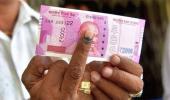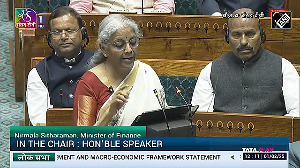'However, to establish a quid pro quo, one can potentially see several things, like whether they got any benefits from the party that they gave money to. That is something that people (of India) will gauge.
But to finally establish that there was money paid as consideration, it would require an investigation, a proper investigation, to be able to come up with such conclusions.'

Transparency and accountability activist Anjali Bharadwaj, who is among one of the many public-spirited figures in the forefront of bringing in more transparency and accountability in electoral funding in India, discusses the fallout of the release of data related to electoral bond scheme funding once the State Bank of India submits to the Election Commission of India on Monday, March 18, the most crucial piece of information – the secret, invisible alphanumeric serial code that acts as a unique identifier link between the purchaser, donor and redeemer of electoral bond.
This code, many experts claim, can help ascertain which donor gave how much money to which political party, in the ongoing saga related to release of all data about electoral bonds that the Supreme Court of India had declared unconstitutional on February 15, 2024.
The Supreme Court on march 15 has directed the State Bank of India to disclose the electoral bond details, along with unique serial code numbers to the ECI by Monday.
Can SBI still explore any loophole in this directive or find out novel tactics to, again, delay this information?
The court has issued them notice. So on Monday, we will hear what they have to say, why they have not provided these bond numbers. So if they say that they don't have the bond numbers readily available or they need more time or any of that, that's when we will get to know what the reason for them not providing the information is. But the (Supreme Court’s) direction is very clear.
Can the SBI still delay these unique serial identifiers that can be used to match the bond purchaser and redeemer?
What the SBI is trying to say is that they don't have this information readily available. That is what it appears they were saying when they were said (first told the Supreme Court on March 6 that) they can't do the matching exercise.
If they had the bond purchasers’ data along with bond numbers and the redeemers’ data along with the bond numbers, they would not really have needed to seek more time from the Supreme Court at the time when they were asking for four months.
Matching will not take long if they have these two figures readily available. When they were saying that it'll take time for them to match, at that time, Harish Salve was giving certain sort of reasons. He appeared to be giving the reason that we (the SBI) don't maintain it because of reasons of anonymity in one place, et cetera, et cetera.
What happens once these serial numbers that are unique identifiers of each bond, issued, purchased and cashed, come into the public domain? What will these unique serial numbers expose?
It's an alphanumeric code which every electoral bond has, which is visible under UV light. Each bond carries this unique alphanumeric number.
Now, if that number is mentioned in front of the name of the donor, or rather the purchaser, and it is mentioned in front of the name of the redeeming party, then that link can be made as to who has given the bond to which political party.
Today (March 15, 2024), the information that we have is a list of all the purchasers of electoral bonds. And we have the list of all the redeemers of the electoral bonds, what denomination and what date they redeemed the bonds (in two different silos).
What we don't have is the link between the two. Who donated the electoral bond to whom? If this alphanumeric unique code is disclosed for purchasers and redeemers, then that matching will become possible immediately.
Once this matching is done, could a quid pro quo be established between the purchaser and redeemer of the bond?
Once the matching is done, then it becomes very clear who gave to whom.
For example, Futures Gaming Company (Tamil Nadu-based lottery company owned by Santiago Martin which has donated Rs 1,368 crore worth of electoral bonds) seems to be the one that has given the maximum amount of bonds to political parties. But there is no way to tell whether it went to the ruling party or to any of the opposition parties, or part went to the ruling party, or part went to whichever party it went.
Now, when the unique numbers come out, it becomes clear who they gave it to.
However, to establish a quid pro quo, one can potentially see several things, like whether they got any benefits from the party that they gave money to. That is something that people (of India) will gauge.
But to finally establish that there was money paid as consideration, it would require an investigation, a proper investigation, to be able to come up with such conclusions.
There are already demands for a Supreme Court-monitored special investigation team, just like the ones constituted by the apex court to investigate 2G and Coalgate scam during UPA II.
The whole point -- and that's what even the Supreme Court said – that the reason why money is given by corporates to political parties is for a consideration, because they want a quid pro quo. So if the quid pro quo is to, let's say, get contracts which otherwise they might not have got, then that becomes like a kickback. And that would qualify as corruption.
The reality is that it therefore appears that this entire anonymous funding mechanism could potentially be a large corruption scam, which will then need to be investigated. At the end of the investigation, there might be some transactions that might appear (above suspicion), or there is no conclusive evidence of quid pro quo and there might be cases where quid pro quo can be established, or it can be established that some companies donated money to a political party only after they were raided by investigation agencies and to escape inquiry gave protection/ extortion money via electoral bonds.
All of this, then, however, needs to be investigated. That's the purpose of the justice system.
Will Indian citizens be able to figure out if these bonds were purchased by loss making companies, foreign corporates operating in India via shell companies? Or, if monies were round tripped from offshore tax havens to India to purchase these bonds? Could this link be established using these unique serial identifiers?
These links can already be established. You don't even need the unique numbers because if one looks at who has made the donations and one knows where to look for this information on every company that's registered, that is available on, let's say, the ministry of corporate affairs’ website, one can make out if it's a loss making company or not. You don't need the unique number to make that discovery.
So if there is, let's know, a Futures Gaming company or there is Megha Engineering (a Telangana-based form that donated Rs 960 crore worth of electoral bonds), then people can just find out whether they're loss making or profit making companies. That doesn't require a unique number of the bond.
Again, whether these are shell companies is also something that can be found out by finding the date of the setting up of that company. So if they were just fly-by-night operators, you would know that they came up shortly before (making the donations via electoral bonds) or they really don't have any transactions that will be available information in the public domain in many cases. That's the kind of information that people already can find out. It will require some probing by citizens on publicly available data and that they will know already.
But what is not available right now is who this loss making company gave the money to or who did the shell company give the money to? Was it to the BJP or the Congress or the TMC? That is what is not available right now. These details will come to light only when these alphanumeric unique identifiers are disclosed.
There are a lot of conversations happening across WhatsApp groups, across social media circles asking how does it impact one? How does it affect me as a voter? Did it put me at a loss? Is the public exchequer at a loss because of these anonymous, political donations? How would you build a case around that?
How this works basically is that, and this is something that the Supreme Court has noted, is that we are talking about lack of information to a voter. This is about violation of Article 19 of the Indian Constitution, which is what the Supreme Court has talked about while declaring electoral bonds unconstitutional (in its judgment dated February 15, 2024).
What they've said essentially is that as a voter, when I go to vote -- and in India, we know that people generally vote for parties. They don't vote for candidates -- I should know who funds the political party who I am voting for.
When I go to vote, I should have a right to know the various political parties that are in the fray, where they are getting their funds from because they (the political parties) are likely to work for people who fund them. It's a violation of people's and voters (fundamental) right to know and they can't cast an informed vote if they don't know who's funding which political parties. This was a very big loss, clearly.
The other thing which we need to discuss here is the possibility of a quid pro quo, which is really the most significant big ticket form of corruption in India right now.
In any country, one of the most egregious forms of corruption, big ticket corruption, is when money is given to political parties and especially the ruling party, which forms the government to make policies, laws and then for it (the ruling party) to give out projects not in public interest, but in the interest of some corporate or some company or industry or industrialists.
This would totally qualify -- if it were happening -- as corruption under the Prevention of Corruption Act, for example. This is certainly something which impacts every citizen of the country.
What is the Supreme Court judgment saying? It's basically saying that this form of corruption is actually clientelism because the companies that are giving the money are acting like clients of the political party, which is then going on to form the government and then, for example, if there are laws that are made which are considered anti-farmer, anti-poor but are actually made to favour some corporate interests, then what can be worse for people? That's something that really harms public interest.
Will this electoral bond scam stick on Narendra Modi led BJP just like the 2G or coalgate scam stuck on UPA II under Prime Minister Dr Manmohan Singh? Will Prime Minister Narendra Modi face electoral backlash because of the alleged electoral bond scheme scam?
The Supreme Court judgment itself (of February 15, 2024 that struck down the electoral bond scheme as unconstitutional), in many senses, is the biggest indictment (of the Narendra Modi government) because what the court is saying is that this kind of anonymous funding by corporates is done basically for them to gain benefit, especially when loss making companies are giving money and shell companies are being used, to funnel money into political parties. This is basically a way of giving kickbacks, of corruption.
So, yes, potentially one can say that this appears to be a very large scam which is also being corroborated by some of the data that is coming out in terms of the companies that were making the donations, which had probes going on against them, and they sort of gave the donations while the probes were happening or they were getting very large contracts around the time that they were making electoral bond payments.
But like I said, that for it to be established, one would need an independent and unbiased investigation, one which is not controlled by any political party, including the ruling party.
If that happens and the facts come out, then only then will we be able to establish the corruption and the extent of the scam.
Would you be surprised if names of Chinese companies, Israeli companies, Russian companies were to figure out in the list of donors to the Bharatiya Janata Party?
I would just say that, look, many things are possible.
We've had an amendment to the FCRA law (under the electoral bond scheme) which has allowed Indian subsidiaries of foreign companies to put money into our political parties. Now, because they (Indian subsidiaries of foreign companies) could have bought bonds, one doesn't know how many of these companies that have given the bonds. One doesn't know whose subsidiaries they are. It will have to be established.
There might be some shell companies which might have been set up, but something like this can only be in the realm of conjecture today, and it would be totally inappropriate to conjecture.
We have the data now in front of us and by Monday SBI will have to give the details of these unique serial codes. After that the data will speak for itself.











 © 2025
© 2025